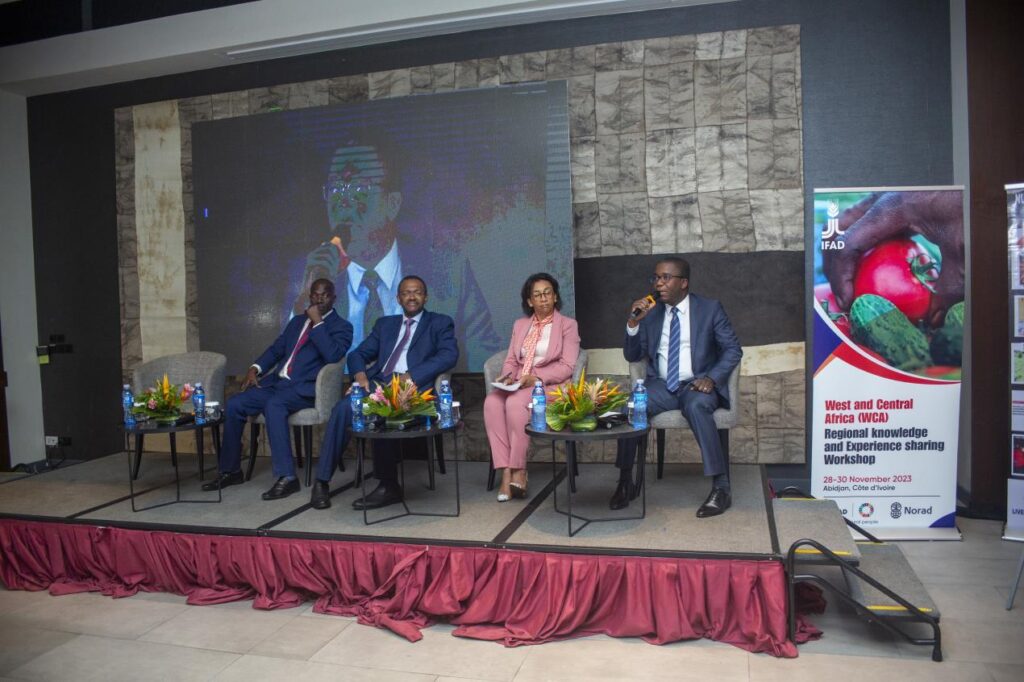- IFAD together with governments, partners and stakeholders are exploring solutions to optimize the contribution of agriculture to nutrition in food systems.
- Africa still experiences a malnutrition burden among children aged under 5 years.
- The continent’s food security challenges are compounded by the war in Ukraine, by supply chain shortages, conflict, and drought.
A regional knowledge and experience-sharing workshop that addresses nutrition, rural development and food system transformation began today in Abidjan, Côte d’Ivoire. Improving food and nutrition security in West and Central Africa (WCA) is crucial. It is estimated that 29.8 per cent of the population of West Africa and 13.9 per cent of the population of Central Africa are undernourished.
For three days, representatives of rural development projects co-financed by the International Fund for Agricultural Development (IFAD) together with governments, partners and other stakeholders will explore solutions to optimize the contribution of agriculture to nutrition in the context of food systems in WCA.
The workshop will focus on nutrition-sensitive interventions and approaches IFAD’s nutrition action plan (2019-2025) and the capacity development plan for mainstreaming nutrition in IFAD investments.
Read also: Ecowas adopting Rwanda’s recipe on school meals as economic catalyst
Impact of climate change on agriculture – IFAD
In the region children under five have high rates of stunting, wasting and micronutrient deficiencies. The adult population is also faced with high rates of micronutrient deficiencies; pregnant and breastfeeding women are often underweight; and the growing prevalence of overweight and obesity is contributing to an increase in non-communicable diseases (NCDs).
“In our region, a shift towards more sustainable food systems and healthier diets for the population is definitely achievable. However, many factors, such as the lack of targeted investments, poor infrastructure, the impact of climate change on agriculture, and the high cost of a healthy diet, often prevents people from getting the food they need,” said Bernard Hien, Regional Director, West and Central Africa, IFAD.
“We are working hard to improve food security and increase the consumption of diverse and nutritious food. Supporting women and youth in their endeavours, particularly in the processing and marketing of nutritious products is one of our key priorities in nutrition interventions and it contributes greatly to our broader development objectives. I am very much looking forward to this workshop which offers an excellent opportunity to share learning and good practices among key actors of the region,” he added.
Participants will also share best practices for nutrition-sensitive approaches, take advantage of peer-to-peer learning, and overall strengthen capacity to deliver nutrition-sensitive interventions. Around 85 participants, including representatives from 27 nutrition-sensitive projects in the WCA region, are taking part in the workshop.
Any progress in fighting malnutrition in the region must contend with the increasing effects of climate change, conflicts, and environmental degradation.
In this context, governments do not always have sufficient adaptive capacities at national and sub-national levels to deal with the impact on nutrition.
Besides investing with its Member States in the region to address nutrition and food systems transformation, IFAD also is engaged in country, regional and global policy platforms, and is a leading advocate for the role of small-scale agriculture in food systems and potential to help address problems of malnutrition, not only regionally but in the world’s food and nutrition security overall.
Greater food and nutrition security
Over the past five years, IFAD has made significant progress in mainstreaming nutrition in its investment portfolio. The proportion of IFAD projects expected to support nutrition-sensitive interventions has increased from 33 per cent in the Tenth Replenishment period of IFAD to 60 per cent in the current (IFAD12) three-year replenishment cycle.
In addition, the priority given to young people and women are enabling them to develop and manage agri-food businesses, among other actions that contribute to greater food and nutrition security.
Read also: Malnourished Africa: Is nutrition based Agenda 2063 palatable?
